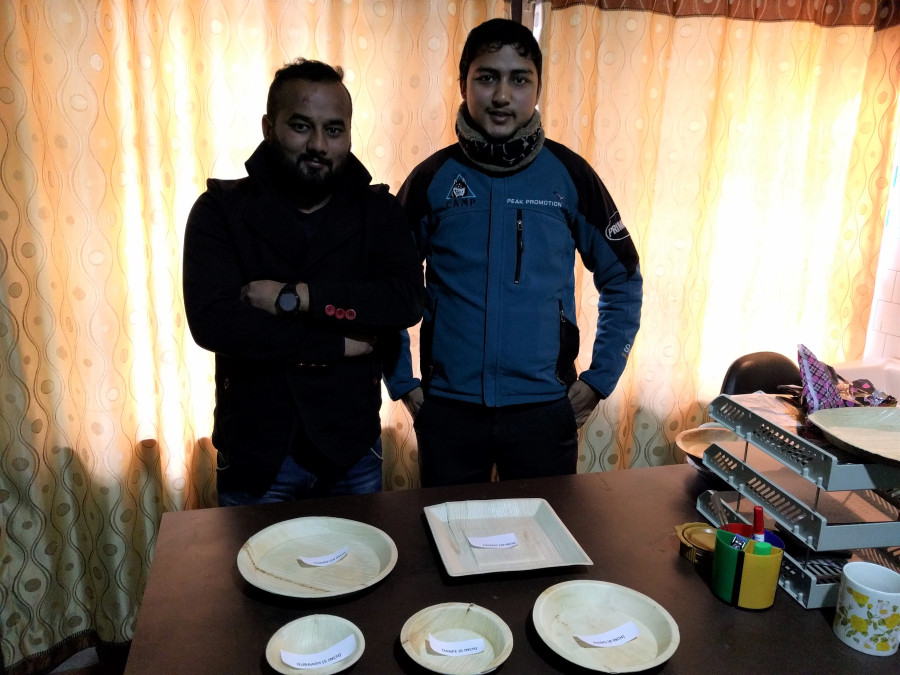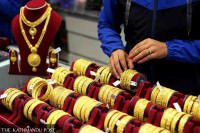Money
Three young entrepreneurs produce areca leaf plates
Probit Singh Baniya, Bidhan Pokhrel and Swaviman Acharya have two things in common: They are college friends and engineers by profession. Another thing common among these three 20-somethings is the passion to start a business of their own.
Naresh Neupane
Probit Singh Baniya, Bidhan Pokhrel and Swaviman Acharya have two things in common: They are college friends and engineers by profession. Another thing common among these three 20-somethings is the passion to start a business of their own.
This interest has led them to establish Leaf Plus, a start-up that has started manufacturing biodegradable disposable plates of areca nut tree leaves for the first time in Nepal.
The success rate of start-ups in Nepal, like everywhere else in the world, is quite low. Yet the three have mustered courage to ditch lucrative engineering jobs and embark on a journey that could deplete their savings or, worse, leave them bankrupt.
“We took the plunge because we wanted freedom and wanted to become our own bosses,” said Kobit, 27, who holds a bachelor’s degree in electronics and communications engineering and was working for a telecommunications company.
The idea to start a business came out of a conversation among the three in January 2017 when they were hanging out at the office of Swaviman, 25, who holds a bachelor’s degree in mechanical engineering and was working as an insurance surveyor prior to setting up the company.
“As we were brainstorming, somehow we ended up with the idea of producing biodegradable leaf plates,” said Swaviman.
After conducting research, the three found out that there was a huge demand for disposable plates, especially during marriages, life-cycle ceremonies and casual parties. The three also found that a growing street-food culture meant increasing demand for disposable plates.
But most of the disposable plates available in the market were either made of plastic or paper. A novel way to penetrate the sector and carve a niche, according to the three, was to launch biodegradable leaf plates on a massive scale.
Soon, they hit the market to gather information about suppliers of plates made of leaves. A walk around Asan revealed that most of the biodegradable plates available in the Kathmandu Valley were made of leaves of sal trees (Shorea robusta). The three then conducted a study on suppliers of these plates made of sal leaves. This led Kobit and Swaviman to travel to Nawalparasi district.
Suppliers of plates made of sal leaves in Danda, Nawalparasi said that they were not in high demand due to two reasons: They are stitched using small bamboo sticks, and they are not good for holding liquid food because they leak.
The three realised that these defects could prompt consumers to choose plates made of other materials. So they started searching for a solution to these problems on the internet.
“During this process, we found that some firms in the Indian state of Tamil Nadu were producing plates using areca nut tree leaves,” said Kobit. “We also found that plates made of areca leaves were sturdier and non-porous, and could be made at a relatively low cost.”
The trio then contacted Hari Dahal, secretary of the Agro Crops Promotion Centre and an areca nut farmer based in Jhapa. Dahal was the only person in the trio’s contact list who could provide key information about areca nut trees. One vital piece of information that Dahal provided was that there are about 3.6 million areca nut trees in Jhapa, Morang and Sunsari.
Another thing they found out was that each tree naturally sheds eight to nine leaves per year, which means around 28.8 to 32.4 million leaves go to waste annually, and which could be used to produce plates.
“The abundance of areca nut leaves and trees implied there would be no shortage of raw materials to produce plates out of areca leaves,” said Swaviman. “This was when we finalised our decision to go into the business of manufacturing areca leaf plates.”
Immediately, Kobit and Swaviman headed for Tamil Nadu to learn the techniques of producing plates from areca leaves and purchase a machine. Then in August, they set up their factory in Hetauda at a cost of around Rs800,000 and started test production. By the end of November, their start-up began producing about 1,000 plates a day from around 500 areca leaves. Each plate sells for Rs6 to Rs25, depending on the quality and size.
“Market response has been very good so far,” said Kobit. “We have thus decided to scale up production by buying five new machines. So, we will soon be able to produce about 6,000 plates per day, which translates into about 180,000 plates per month.”
Surprisingly, areca nut farmers are also very happy as they can earn Rs1-2 per leaf selling leaves to Leaf Plus. Two to three plates can be made from one leaf.
So far, the three do not regret leaving their comfort zones and are happy things are going their way. “But when you start doing business you obviously have to take certain risks, and there is always the fear of the emergence of a competitor who can outperform us,” said Swaviman. “Yet, we are ready to accept that challenge.”




 18.2°C Kathmandu
18.2°C Kathmandu















